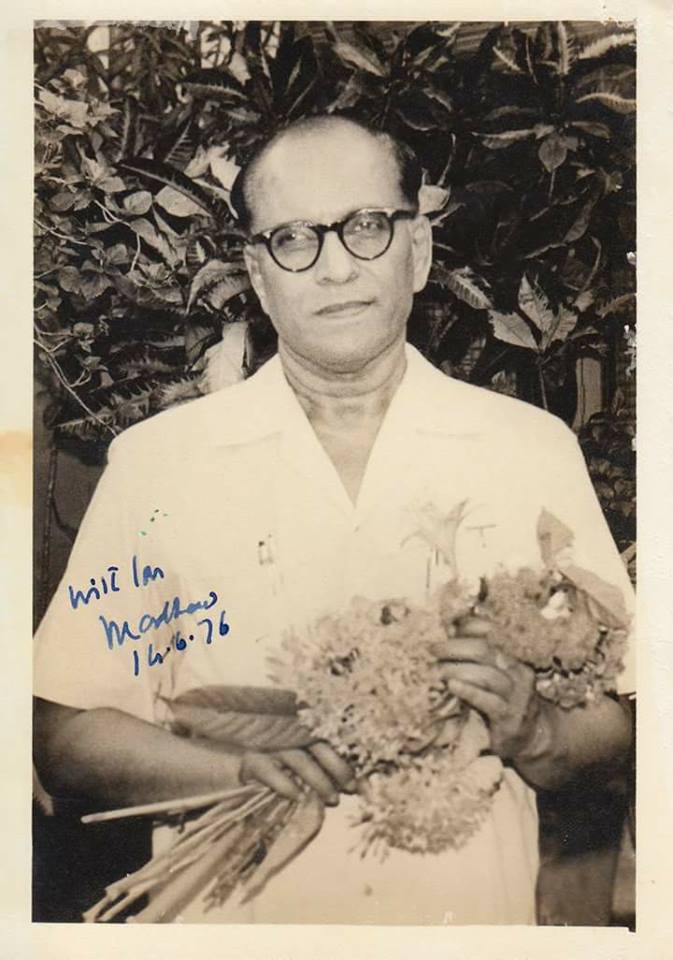
Dear Friends,
Madhav Pundalik Pandit, better known as M. P. Pandit, was born on 14 June, 1918. He visited Pondicherry for the first time in 1937 and had the Darshan of the Mother on 4 April and that of Sri Aurobindo on 15 August. After completing his B.Com with high honours he joined the Ashram as an inmate in 1939. He started working under Nolini Kanta Gupta as his assistant but later became one of the Mother’s secretaries. He also supervised the management of several guest-houses run by the Ashram. His other responsibilities in the Ashram included renting houses for the inmates, answering letters sent to the Ashram and editing journals like World Union, Advent and Service Letter. A prolific writer, his published works exceed one hundred titles. His notable works include Japa, How Do I Begin?, How Do I Proceed?, Mother and I, Sidelights on the Mother, Mother and Her Mission, Life Beautiful, An Early Chapter in the Mother’s Life, Pitfalls in Sadhana, Yoga of Self-Perfection, The Yoga of Knowledge, Readings in Savitri (in ten volumes) and Sat-Sang (in seven volumes).
In May 1976 M. P. Pandit received an invitation from the Secretary of Sri Aurobindo Society, Singapore, to visit the city and give a series of talks on Sri Aurobindo. When Nolini Kanta Gupta was informed of this invitation, he remarked that people are going to hear an ‘authentic voice’. M. P. Pandit left for Singapore on 8 July 1976 and delivered talks at Sri Aurobindo Society, Ramakrishna Mission and Singapore Writers’ Association. This was followed by another invitation to speak in the United States of America. M. P. Pandit left for U. S. A. in March 1977 and for the following few months, spoke at various places like the Princeton University, Purdue University, Wake Forest University, University of Colorado, University of Denver, Northern Arizona University and Krotona Institute of Theosophy to name a few. In the following years he travelled extensively and lectured on Sri Aurobindo and his message in various conferences, symposiums and seminars. In his lectures he urged his listeners to transform themselves from being a self-centred individual to a Universal Man.
In Pondicherry, numerous people would flock to the residence of M. P. Pandit where he would organize spiritual discourses regularly. Those who attended these discourses left with an enlightened heart and satisfied soul. There were many who would write to him from various parts of India and the globe or make phonecalls to seek his guidance, advice or solace. And M. P. Pandit was always ready to help anyone in distress. He left his body on 14 March 1993 at a hospital in Madras.
2018 marks the Birth Centenary of M. P. Pandit. As our humble homage to him, two of his interviews published in the New Nation (Singapore) and The Indian Review (Chennai) in July and August 1976 respectively have been published in the website of Overman Foundation along with a touching tribute paid to him by K. D. Sethna alias Amal Kiran and some of his photographs.
With warm regards,
Anurag Banerjee
Founder,
Overman Foundation.
___________
Madhav Pandit Passes Away
When I went for a last look at the body of my friend Madhav Pandit, who had passed away on March 14 at the age of 75, I could not help putting my hand upon his forehead at the moment I arrived by his side and again at the moment I left it. At this touch of affection, happy memories surged up.
What I most remembered in general about Madhav was his combination of spiritual self-discipline, wide mental scope, spontaneous non-ritualistic devotion to Sri Aurobindo and the Mother, varied learning and yet humble desire to be taught, warm cheerful temperament and laughing superiority to adverse circumstance.
He who had made a detailed study of the ancient scriptures was still quite ready to admit a mistake and seek correction from an unscholarly dabbler in scriptural lore. While hundreds regarded him as the last word on subtle problems he would time and again want a confirmation or correction from one who was a tyro in comparison. Then there was his sympathy and quick response and happy trust. I vividly remember an incident many years ago. I was living on my own means at the time. Finding myself in financial straits I sought a loan from him. He readily agreed to a series of advances month after month from a book-printing organization he had formed. I wrote out a grateful receipt of the first installment and gave it to him. Instantly he tore it to bits and threw it into the waste-paper basket. I caught hold of his hands affectionately and have never forgotten this gesture of absolute faith on his part.
His helpfulness to fellow-sadhaks, even to those whom others regarded as small fry, could always be counted on. He would do all he could to make their way smoother. There was also his friendly turn towards souls in difficulty or uncertainty. Pitted against powerful presences, they would depend on him to slip to them some private information which would enable them to come up fighting when a cause seemed forlorn.
Certain ways of his which smacked of “guruship” were balanced by the utterly unassuming attitude he had towards his so-called “disciples” upon non-formal occasions. He considered those ways to be in consonance with the traditional Indian mind which practised feet-touching and blessing-receiving wherever a higher consciousness was felt to be present. I was sure that inwardly he passed on to his Gurus whatever act of reverence was done towards him and there was the plausible argument that if the act was not sought for but allowed because it was a psychological aid to the doer, there could be no harm. On hearing this argument I wrote an article which, among other things, tried to show that in the long run the act could harm both the doer and the receiver. Naturally I sent the typescript to Madhav, asking him whether it could be published in Mother India. His prompt reply was: “Why not?” So the piece went to press, but when it was in the galley state I found that a party wanted to make use of it as the main tool of a campaign of denigration of Madhav. At once I withdrew it lest it should serve in malicious hands to make one debatable aspect loom unduly large of a person who had many admirable sides to his character and who in his private personal relationships never put on airs.
I may also glance at Madhav’s extreme orderliness of method and efficiency of execution. The Mother had full confidence in his assessment of a situation and in his management of it. If accounts kept by him and by other agents differed, she would give preference to his. Along with meticulous method went his phenomenal memory for small items like people’s addresses. Everything was in its proper place both in his mind and in his daily life. But I never found anything rigid in his manner. He was always ready to change according to the need of the moment.
Now a word about his literary activity. He was an accomplished impressive speaker, very much in demand. Nobody in the Ashram has written so many books of lucid direct exposition of the Master’s and the Mother’s teachings. Nor has anybody done as many extensions of these teachings to touch problems theoretical or practical of sadhana. Not that one could always agree with all his pronouncements, but there was seldom any pronouncement which did not open up some vista which would lead one to make some discovery of one’s own.
Here was an enterprising adventurous mind looking in diverse directions—and behind it one felt a questing soul ever remembering the glory it had seen and loved and obeyed: Sri Aurobindo’s vast-visioned wisdom and the Mother’s deeply insightful care and creativity.
K. D. Sethna (Amal Kiran)
Moving Towards Perfection
Mr. M. P. Pandit, 58, is a visiting Indian author of more than 80 books on various subjects including yoga, world unity, politics, psychology, culture, socio-political aspects and humanities. He is secretary of the Sri Aurobindo Ashram, India, which initiated the development of Auroville, an ideal city designed to portray “perfect life in a perfect society.” The Auroville experiment was endorsed by UNESCO in 1968.
Mr. Pandit, who is also a Sanskrit scholar, is chairman of the World International Union, which has branches in a number of countries.
An interview by Rav Dhaliwal of New Nation, Singapore.
Rav : Mr. Pandit, could you outline the concept on which Auroville is based?
Pandit : Auroville is an attempt to get away from the old social order and initiate a new society free from competitive economic motive. In this pattern of life, there is equality of status. There are no bosses, no distinctions of race, religion or politics, no private property. Work is not done for money. All work towards a common goal. There are no religious institutions such as temples, mosques or churches. Only those who have gone beyond the need of religion and material possessions qualify for Auroville. Individuals are free to conceive of God as they wish. They are helped to live a free and integrated life.
Rav : To what stage has it developed so far?
Pandit : To date, Auroville has a population of about 400 people from nearly 20 countries including India, Canada, South America, Australia, Israel, East Africa, Tunisia, France, Germany and several other countries of Europe.
The city is expected to provide for 50,000 people when it is fully developed. There will be another 50,000 living on the periphery and supporting the city. It will cost billions of dollars before Auroville is fully developed.
We have had to absorb and orientate the indigenous Tamil community living at the Auroville site along with the development of the city. Some of them have chosen to change their way of life and join the new model city.
A number of countries have offered to open pavilions to represent their cultures in Auroville. A visual representation of national histories is planned in the pavilions.
Rav : What is Auroville’s source of income to support the society, since no salaries are paid?
Pandit : At present we are receiving contributions from all over the world to develop the city and look after its present basic needs. Each member of the society does the work he is equipped for—engineers, doctors and other professional workers, for instance, pursue their professions. The society takes care of the individual. It provides for basic needs such as food, clothes and medicare.
At the moment, we are trying to develop agriculture and small industries. The idea is to work towards a measure of self-sufficiency as well as to export products from the industries to support the society.
Rav : What sort of an education system will the city have for the young?
Pandit : We are setting up some schools—but these will only be for the transition period. We are working towards a state of development when children will not have to sit in the classroom for formal education but learn whatever they want from whoever they wish. For instance, you would have those interested in the arts learn from artists and likewise those who prefer technical work would go to the workshops to learn their trade.
The talents of the children will be helped by the society to develop along their natural lines. The children will in this respect be given a greater role to play.
Broadly, it is an experiment to find out what mode of education will suit the new generation.
Rav : Do you envisage any indiscipline as a result of such a system for the young?
Pandit : Initially, yes. But they will settle down soon and play responsible roles in the city.
Rav : Have you set a target for the completion of development of the city?
Pandit : It is difficult to say how long it would take to complete the city. Another 20 years or so should see it in good shape.
Rav : The World Union International aims at fostering greater world unity. Is such world unity possible and if so, how do you think it can be achieved?
Pandit : The World Union aims at fostering greater world unity through psychological and spiritual means. We have realised that political means are not enough to achieve such unity. We therefore feel that we have to prepare the human mind first. To this end, the various branches of this body throughout the world work for the spread of the idea through books, journals and seminars.
In January next year, the body will hold an international seminar on The Next Future. This will be attended by many thinkers and social and political leaders from India and abroad.
It is my expectation that the world will move towards greater unity during the next decade. It is obvious that the old order of society both in the East and West will break down and new experiments will be made. Present methods of administration, education, social living—and in fact the whole balance in the society—will be radically overhauled.
There will be less divisions on grounds of race, religion, wealth, and political ideologies. The doctrine of communism as has been applied will no longer hold. The growing interdependence between nations will force a certain sanity among world nations. The outer form of independent states may continue to satisfy the national ego but they will move towards a greater oneness.
New Nation, 20 July 1976.
Past and Present
An interview by A. Ranganathan of The Indian Review, Madras
A.R. : I note that you have several books on the Vedas, Upanishads, the Gita, the Tantras and the Yoga of Sri Aurobindo and the Mother to your credit. Could you explain whether the different spiritual and yogic disciplines expounded in these great scriptures lose their identity and merge into the yoga of Sri Aurobindo, even as the different rivers mingle their waters in the sea?
Pandit : No, they do not. Each line of Yoga has its own aim as well as its procedure. The principles of all these Yogas are assimilated into the Integral Yoga, not necessarily their processes. For instance, in the Vedic setting, the Yoga is largely one of sacrifice. In the Upanishads, there are the well-known Maha-Vidyas opening up vistas of a new vision towards the realization of the Supreme. The Gita stresses on Karma Yoga and also develops Bhakti. The Tantras aim at fusing the lower and the higher natures. But as I said earlier, their principles are assimilated.
A.R : I would like you to clarify another aspect of my question. If the Yoga of Sri Aurobindo can be regarded as a quintessential distillate of the teachings and experiences of the great path-finders of India through the ages, would you suggest that it is self-sufficing in the sense of eliminating the need for the different contending faiths and disciplines that ultimately trace their source to Hinduism?
Pandit : No, Sri Aurobindo’s Yoga assumes new dimensions ranging across the culture and tradition of spiritual India. These have perfected the technique of developing the new consciousness in Man. But until the stage is reached where this new feature becomes visible, its immediate discipline and method have a part to play in developing man Godward. Man is to be raised to an optimum level of spiritual development through one means or another. The various techniques of the hitherto practised Yogas have to be pressed into service with suitable modifications in tune with the positive ideal of fulfilment or perfection in life so as to reflect Sri Aurobindo’s Yoga.
A.R. : This leads me to a fundamental question. Sri Krishna achieved a similar synthesis of the paths which were in vogue at the time, notwithstanding his celebrated emphasis on Karma Yoga. If I have understood the approach of Sri Krishna correctly, he does not appear to have ruled out other paths but actually indicated their continuance in the scheme of things. Similarly, would Sri Aurobindo’s Yoga accept other paths and disciples as necessary for the development of persons of different degrees of awakening, need and development?
Pandit : Broadly speaking, yes; however many of the older paths aim at an ultimate withdrawal from life whereas Sri Aurobindo insists on spiritual fulfilment in life. So in these syntheses, he utilizes the methods, but changes the direction. These different modes of the orientation of consciousness are chosen keeping in mind the different natures of seekers and their levels of growth.
A.R. : Viewed in this perspective, I would like to draw your attention to Sri Aurobindo’s writings on practically every spiritual path followed by our seers and saints across the corridors of time from the Rig Vedic Rishis to Sri Ramakrishna Paramahamsa and Swami Vivekananda and the manner in which he integrates them into the scheme of Hindu faith and religion. Did Sri Aurobindo view these erstwhile exercises which enabled their practitioners to integrate some parts of the totality of India’s spiritual heritage as relevant to our times?
Pandit : Sri Aurobindo always held that the essential wisdom of the past had always a bearing on the movement of the present towards the future. But this does not mean that everything of the past in the same old form is relevant to the present. Much of the past was related to the circumstances and conditions of those ages. Hence the relevance is of the fundamental principle or in a sense, of the past tradition.
A.R. : I am rather intrigued by what could perhaps be described as the ‘Triveni’ of our time: Sri Aurobindo was an alien to our tradition and culture until he returned from England. The Mother was the inheritor of the occult and mystic traditions of Europe. And Sri T.V. Kapali Sastri, cradled in Brahmin orthodoxy, was the inheritor of the Vedic and Tantric traditions. Sri Aurobindo unveiled the mystery of the Veda, reconciled the polytheism of the Vedas, the monotheism of the Upanishads, the Karma and Bhakti Yogas of the Gita and the contending schools of Advaita, Visishtaadvaita etc. Above all, he integrated the occult and spiritual traditions of the West into his Yoga. Just as the Mother stressed the universality of the New Path, so did Kapali Sastri establish the Vedic and traditional foundations of Sri Aurobindo’s findings. Interpreted thus, would I be right in suggesting that Hindu religion is not denominational but universal, yet containing a medley of denominational faiths to suit persons of varying degrees of evolution?
Pandit : Sri Aurobindo always demurred when Hinduism was called a religion. To him, Hinduism is a large way of life embracing humanity at every level of development in different wave-lengths of thinking, opening the doors to as many as possible towards an inner or higher development of Nature. It is in this sense that he once observed that the larger Hinduism was the way for the world to arrive at unity. Obviously Hinduism does not mean the system of creed, dogma and ritual as some of the obscurantists make it out to be. It is a plastic scheme by which each man can awake to the existence of God within himself and cast his life in the growing mould of that indwelling reality. If man is universal, Hinduism is necessarily universal, because it is only another name for the cultural stream of the human flowing into the divine.
A.R. : The impact of modern civilizations is a vast and fascinating interdisciplinary subject that ought to be studied in depth at various wavelengths and in different countries. And switching to South East Asia, one realizes that the old religious patterns have almost disappeared in countries like Japan, Singapore and Malaysia. Could one conceive of a similar situation in India? Does your recent visit to Singapore confirm or reject this assumption?
Pandit : You are right. In a place like Singapore, the old religious patterns have become totally anachronistic. During my recent visit to this young city-state, I found the people to be very tolerant in matters of religion. I realized however that this tolerance was not a result of any understanding of the basic unity of religions but an indifference to religion itself. For in communities like those of Singapore which are becoming centres of technological progress and material affluence, religion has become a relic of the past. If there be a chance for reawakening these people to their inner potential, it has to be through the application of conceptual awareness like the development of consciousness for the fuller realization of the powers of life. And that is spirituality. The age of religion has fulfilled itself in the birth of the age of the spirit. In India, whatever the degree of material or technological growth the accent of the Spirit is never absent. It is in the blood-stream of the race. What we are witnessing today in India, is nothing else than a selective transformation of religion into a slowly flowering spirituality.
The Indian Review, August 1976.
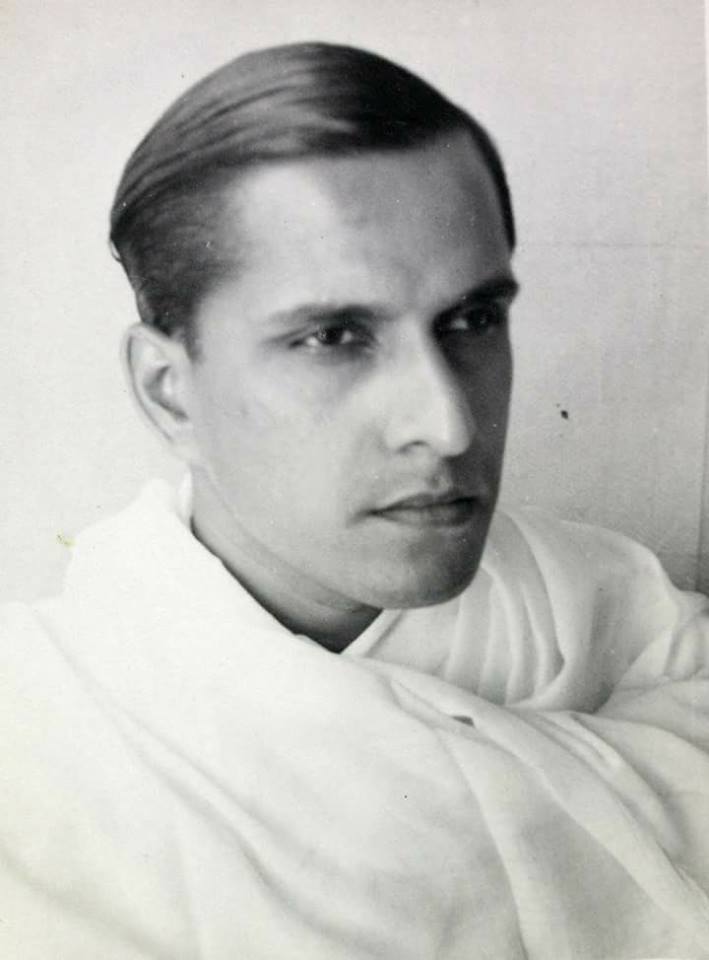
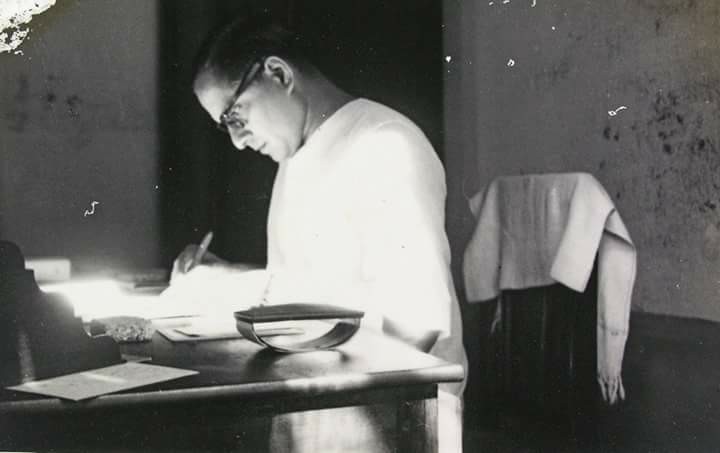
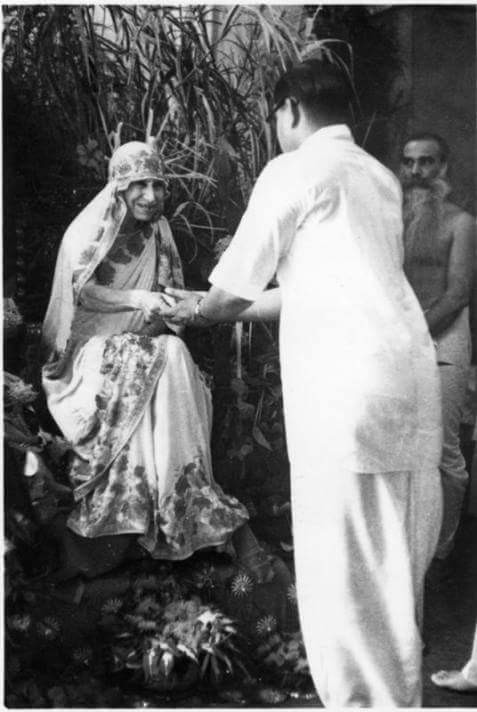 Madhav Pandit with the Mother
Madhav Pandit with the Mother
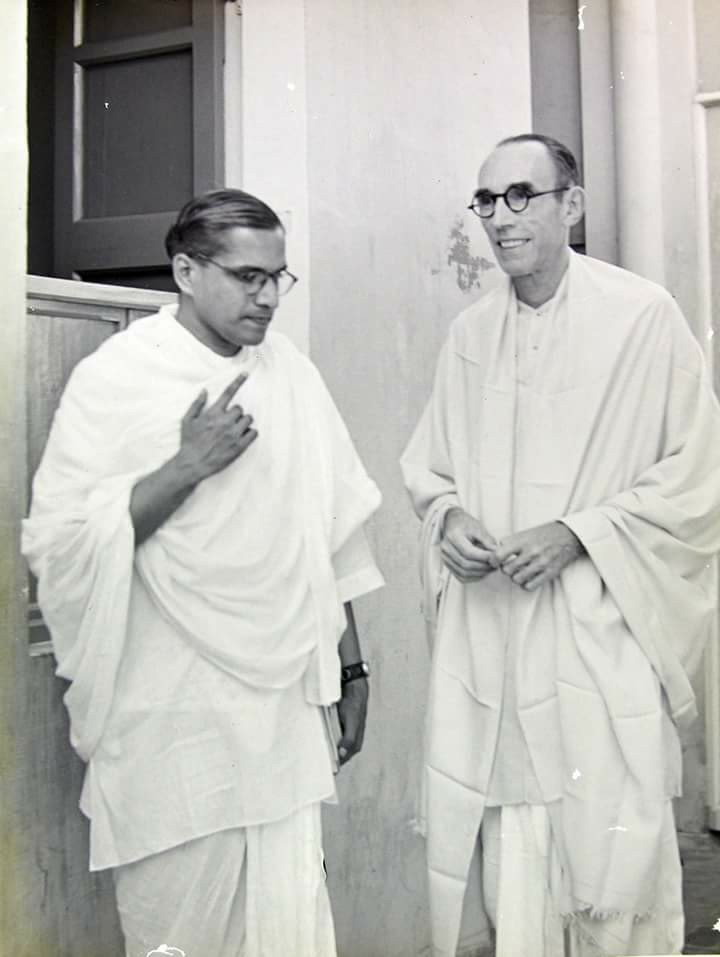 Madhav Pandit with Pavitra
Madhav Pandit with Pavitra
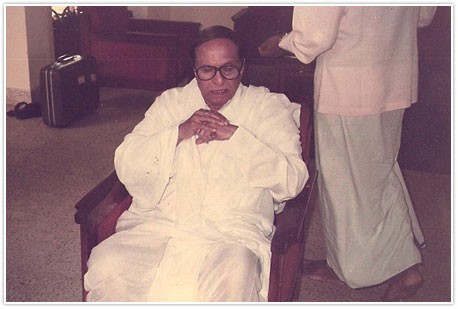
________________
When Georges Gambelon, a devoted disciple of the Mother and Sri Aurobindo, first listened to the music composed by Sunil-dâ, described it as “The Soul speaking to the Soul.”
On going through Amal Kiran’s tribute to Madhav Pandit I had an impression of hearing “The Soul speaking of the Soul.”
About MPP’s response to Amal’s comment for publication in Mother India: “Why not?” This was in the context of MPP’s said Guruhood. In the first instance, Amal should have entirely left things as they were. What was the necessity of his publishing this? There was really no issue involved. It was a matter of his soul’s choice and prompting, particularly when even the Mother was aware of it; it had to follow its own trajectory. MPP was 100 per cent correct in saying what he had said: “Why not?” But then, in an occult way, he perhaps also saw that it didn’t go through.
Sri Aurobindo had warned that the practice of touching someone else’s feet etc could be harmful both to the “doer and the receiver” and Amal Kiran appears to have echoed this years later. Should Amal Kiran have hidden his views just to avoid embarrassing MP Pandit who clearly wasn’t fazed in the least himself.
Dear Anurag
As always, you are bringing so many extensions of the glorious Aurobindonian world.I had
known Panditji, read his books and waited for his newsletter every month and so I am grateful to you for this detailed spread in his memory, He was a sweet child of the Mother. It was thanks to his Herculean efforts that the Complete Works of his mentor, T.V.Kapali Sastri got published, and that helped me no end to write about Sastriar for the Builders of Indian Philosophy series published by Munshiram Manoharlal. A dear friend of my father, he was all that dear Amal Kiran has described. We are indeed blessed to have known these great “sun-eyed children of a marvellous dawn”.
Affelctionately Prema